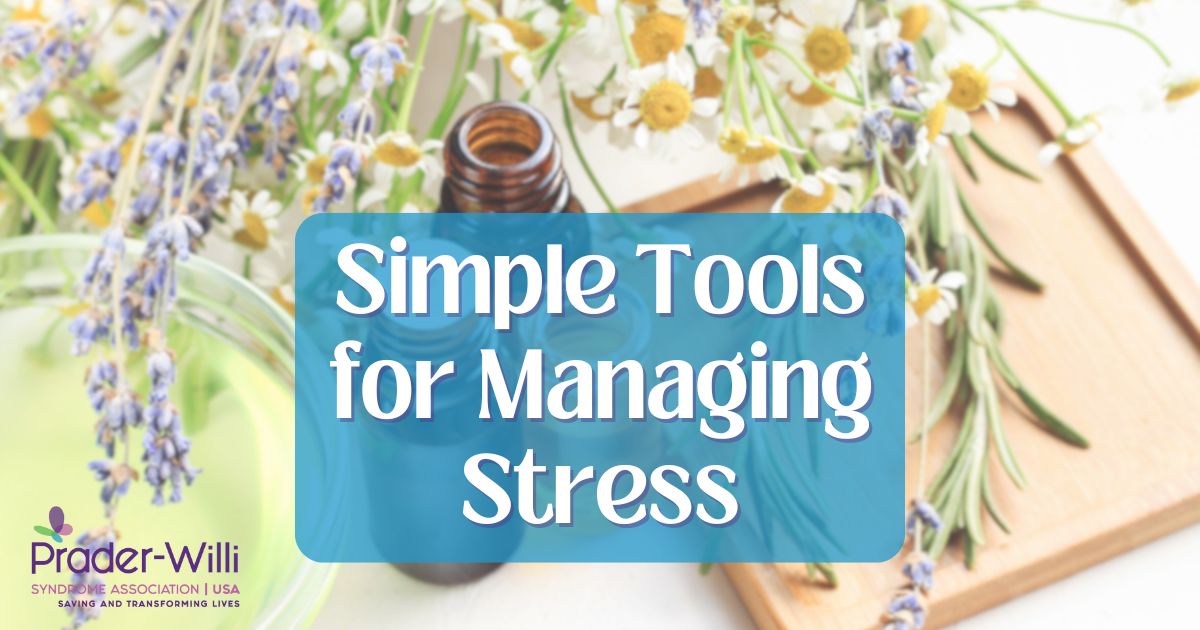Wednesday, November 6th, was National Stress Awareness Day.
Most of us know that stress, especially chronic stress, has a negative effect on our health. Stress can cause a list of physical and mental detriments, impacting our heart and reproductive health, lowering our immune system, and increasing our chances of mental health issues. Knowing that fact can add to our stress, especially if we feel as if we can’t do anything about it.
As parents and caregivers of individuals living with PWS, stress may feel like that growing clutter pile or junk drawer that you know needs to be cleaned out, but you just don’t know where to begin. And while you’re trying to figure how or where to start, more is added to the pile. If you can relate to that metaphor, then the tips below can help you find a place to start. Remember to start small, where it feels comfortable, be consistent, and go from there. You deserve to take care of yourself as well as you care for your loved one with PWS and your family.
Exercise/walk regularly:
Depending on your time, physical ability, and access, working out at a gym, in a yoga class, or simply walking around your neighborhood, local park, or forest can do wonders for reducing stress. Moving your body increases the production of endorphins to aid in stress reduction. Learn more by reading our blog “Exercise, Movement, and Mental Health.”
Limit screen time:
Excessive screen time is linked to higher rates of depression, anxiety, and other mental health disorders. It disrupts your natural rhythms, leading to fatigue, eye strain, and stiffness in the shoulders and neck. It pulls you out of the present moment, encourages a sedentary lifestyle, and, depending on your screen activity, can increase cortisol levels, heart rate, and blood pressure, while also impairing blood sugar control.
This is not to say never get on your screen, but if you find yourself sitting for hours during the day due to being on a screen, be mindful of the need to move your body. If you work on a screen, take frequent breaks to do jumping jacks or squats, walk around the building or the parking lot.
Social media brings a whole list of concerns if used improperly. When using social media, limit the amount of time you are on there, “unfollow” accounts or people who cause you stress or grief, avoid conflict, especially with strangers, and do not “doom” scroll. If scrolling social media is your way of relaxing, consider following accounts that show funny cat videos or comedians. Join informative and supportive groups like the PWSA | USA age groups on Facebook. Hide the social media apps on your phone in “folders” so they are not easily accessible. Creating more steps to getting on social media may help curb the mindless checking and scrolling that many of us know well.
Do something creative:
Creating art helps shift the focus of your thoughts to what you are creating, rather than the stressors of your life. Painting, coloring, and journaling are simple ways to activate the creative parts of your brain, also benefiting your mind’s ability to problem solve. When you are more creative, you are more likely to find necessary solutions to issues.
Meet with a friend:
It can be easy to sink into daily routines at home. We allow ourselves to feel too busy or burdened by chores, errands, appointments, or work to make socializing a priority. But when we meet with our people, we are reminded that we have a community, that there are people who care for us and want to support us. This can be a time to talk and process the challenges in your life or to share some laughs with someone you enjoy. Meet for coffee or on your lunch break. Put kids in a stroller and go for a walk. Turn on a cartoon for your little one and call your friend on the phone.
Practice good sleep hygiene:
Sleep is very important for our health and our ability to manage our daily lives. If you’re tired, you’re likely not as focused or attuned to your situation, you may be cranky or lethargic and unable to be present with your family and friends. Most things may seem more stressful without adequate sleep.
Try to get a good amount of sleep. Strive to have a regular time that you go to bed, preferably early enough to get the necessary hours. Keep your phones out of your bed. Too much screen time in the evenings can affect the melatonin levels needed to fall asleep. Keep your phones out of your bed if you can. If you need the alarm, set it before you get into bed, put the phone down on a nightstand, and then get into bed. Creating simple personal rules like “not looking at the phone while you are physically in your bed” can help create necessary boundaries to screen time.
The same goes with waking up. Try to wake up at a similar time each day. This helps set your body’s rhythm. Avoid looking at the phone and instead go to a window or step outside so your first light of the day is natural light.
Limit caffeine:
Caffeine is a stimulant and affects the body similarly to stress, increasing your heart rate, blood pressure, and levels of stress hormones. Too much caffeine can disrupt your sleep and cause anxiety and digestive problems. As with screen time, the idea is not to cut it out completely if it works for you but be aware of the amount its effect has on your body and mental state.
If you are craving caffeine try a gentler form like green tea or chai. If the taste is what you love, decaf is just as good.
Get fresh air:
“Research shows that exposing your lungs to fresh air, and the scents of flowers and plants, can help to relieve stress and anxiety. Oxygen is thought to affect the levels of serotonin released in the body, in turn, contributing to feelings of happiness and relaxation.” Come outside: the benefits of fresh air | Benenden Health
Aromatherapy:
Aromatherapy has been shown to have an affect on the brain and can alter behavior. Aromatherapy is simply the act of using essential oils and scents to receive this benefit. There are many known calming smells: lavender, orange, sandalwood, bergamot, jasmine, chamomile, and more. Of course, some smells may not be calming to some, and others may have their own personal relationships with scents that bring them peace. Test them out in a store and see what works for you.
To try traditional aromatherapy, you can buy a diffuser and your favorite essential oils to use in your home. There are other ways to receive the relaxing benefits of smells.
Keep a bottle of essential oil in your bag and when needed, screw off the lid and smell. Burn a candle with a calming scent. Or simply buy a bag of oranges and slice when needing an extra push towards.
Reminder:
These may be stressful lives we live, but it is important, necessary, and often simple to implement tools and habits to help reduce and manage your stress. You deserve to take care of yourself.
Share this!





 Jennifer Bolander has been serving as a Special Education Specialist for PWSA (USA) since October of 2015. She is a graduate of John Carroll University and lives in Ohio with her husband Brad and daughters Kate (17), and Sophia (13) who was born with PWS.
Jennifer Bolander has been serving as a Special Education Specialist for PWSA (USA) since October of 2015. She is a graduate of John Carroll University and lives in Ohio with her husband Brad and daughters Kate (17), and Sophia (13) who was born with PWS. Perry A. Zirkel has written more than 1,500 publications on various aspects of school law, with an emphasis on legal issues in special education. He writes a regular column for NAESP’s Principal magazine and NASP’s Communiqué newsletter, and he did so previously for Phi Delta Kappan and Teaching Exceptional Children.
Perry A. Zirkel has written more than 1,500 publications on various aspects of school law, with an emphasis on legal issues in special education. He writes a regular column for NAESP’s Principal magazine and NASP’s Communiqué newsletter, and he did so previously for Phi Delta Kappan and Teaching Exceptional Children. Evan has worked with the Prader-Willi Syndrome Association (USA) since 2007 primarily as a Crisis Intervention and Family Support Counselor. Evans works with parents and schools to foster strong collaborative relationships and appropriate educational environments for students with PWS.
Evan has worked with the Prader-Willi Syndrome Association (USA) since 2007 primarily as a Crisis Intervention and Family Support Counselor. Evans works with parents and schools to foster strong collaborative relationships and appropriate educational environments for students with PWS. Dr. Amy McTighe is the PWS Program Manager and Inpatient Teacher at the Center for Prader-Willi Syndrome at the Children’s Institute of Pittsburgh. She graduated from Duquesne University receiving her Bachelor’s and Master’s degree in Education with a focus on elementary education, special education, and language arts.
Dr. Amy McTighe is the PWS Program Manager and Inpatient Teacher at the Center for Prader-Willi Syndrome at the Children’s Institute of Pittsburgh. She graduated from Duquesne University receiving her Bachelor’s and Master’s degree in Education with a focus on elementary education, special education, and language arts. Staci Zimmerman works for Prader-Willi Syndrome Association of Colorado as an Individualized Education Program (IEP) consultant. Staci collaborates with the PWS multi-disciplinary clinic at the Children’s Hospital in Denver supporting families and school districts around the United States with their child’s Individual Educational Plan.
Staci Zimmerman works for Prader-Willi Syndrome Association of Colorado as an Individualized Education Program (IEP) consultant. Staci collaborates with the PWS multi-disciplinary clinic at the Children’s Hospital in Denver supporting families and school districts around the United States with their child’s Individual Educational Plan. Founded in 2001, SDLC is a non-profit legal services organization dedicated to protecting and advancing the legal rights of people with disabilities throughout the South. It partners with the Southern Poverty Law Center, Protection and Advocacy (P&A) programs, Legal Services Corporations (LSC) and disability organizations on major, systemic disability rights issues involving the Individuals with Disabilities Education Act (IDEA), Americans with Disabilities Act (ADA), and the federal Medicaid Act. Recently in November 2014, Jim retired.
Founded in 2001, SDLC is a non-profit legal services organization dedicated to protecting and advancing the legal rights of people with disabilities throughout the South. It partners with the Southern Poverty Law Center, Protection and Advocacy (P&A) programs, Legal Services Corporations (LSC) and disability organizations on major, systemic disability rights issues involving the Individuals with Disabilities Education Act (IDEA), Americans with Disabilities Act (ADA), and the federal Medicaid Act. Recently in November 2014, Jim retired.